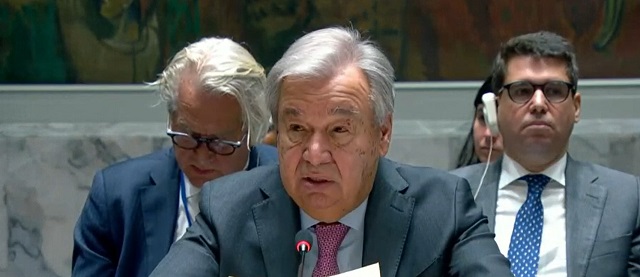Artificial Intelligence
Will AI Displace Climate Change As The Next Globalist Bogeyman?

 From the Daily Caller News Foundation
From the Daily Caller News Foundation
On Monday, before most people even knew its annual General Assembly was again invading New York City, the United Nations issued a press release proclaiming the unanimous adoption of what it calls its “Pact for the Future.” Designed to be a successor plan to its “Agenda 2030” — which the international globalist organization admits is failing — the press release boasts that this “Pact” is designed to create a glorious “new global order.”
Where have we heard those dangerous words before?
The U.N.’s alarmist general secretary, life-long socialist Antonio Guterres, had laid the narrative groundwork for Monday’s press release during a preview delivered last week. In that statement, Guterres – who famously proclaimed the world had entered into “the era of global boiling” last July – advocated for a complete restructuring of the world’s “institutions and frameworks” to address major issues like “runaway climate change,” something that no real data indicates is even happening.
In addition to his usual climate alarmism, Guterres also raised questionable alarm about what he termed the “runaway development of new technologies like artificial intelligence.”
“Our institutions simply can’t keep up,” Guterres said. “Crises are interacting and feeding off each other – for example, as digital technologies spread climate disinformation that deepens distrust and fuels polarization. Global institutions and frameworks are today totally inadequate to deal with these complex and even existential challenges.”
In other words, Agenda 2030, the U.N. plan adopted to leverage those institutions to solve all the world’s problems, has failed. The solution? Why, adopt a new “Pact for the Future” to solve all the world’s problems while also rejiggering all those institutions and frameworks. Sure, that will work.
You would think such an all-encompassing Pact approved by a unanimous vote of the world community would make headline news, but that did not really happen. Perhaps that lack of breaking news coverage can be attributed to the fact that a reading of the document itself reveals it doesn’t really offer many plans for specific action items.
Instead, it reads like something written by the talking points compilers for Vice President Kamala Harris’ campaign — a lot of lofty language that doesn’t actually say anything.
Nowhere is this reality starker than in the section on “affordable, reliable, sustainable and modern energy.” After laying out the rationale for pushing the sputtering, subsidized energy transition – as always, painting oil, natural gas and coal as the convenient bogeymen justifying a forced move away from democratic national institutions to change forced by socialist central planning – the document offers only nebulous talking points instead of action items:
- “Countries can accelerate the transition to an affordable, reliable, and sustainable energy system by investing in renewable energy resources, prioritizing energy efficient practices, and adopting clean energy technologies and infrastructure.”
- “Businesses can maintain and protect eco-systems and commit to sourcing 100% of operational electricity needs from renewable sources.”
- “Employers can reduce the internal demand for transport by prioritizing telecommunications and incentivize less energy intensive modes such as train travel over auto and air travel.”
- “Investors can invest more in sustainable energy services, bringing new technologies to the market quickly from a diverse supplier base.”
- “You can save electricity by plugging appliances into a power strip and turning them off completely when not in use, including your computer. You can also bike, walk or take public transport to reduce carbon emissions.”
It all amounts to bits of advice, much of which constitutes laudable goals. But there is nothing new here, nor is there anything that is going to lead to meeting the UN-invented “net zero by 2050” target. The simple reality is that demand growth for energy – real, 24/7 energy – will continue to outstrip the ability of global or national governments to force reductions in carbon emissions, because modern life is not sustainable without the use of carbon-based energy. Period.
By citing the evolution of energy-hungry AI technology as a development to be feared and attacked, Guterres admits this reality. He also appears to be admitting that the attempt to displace democratic institutions with socialism using climate alarmism as the justification is also failing, thus necessitating the need for a different bogeyman.
It is all so incredibly tiresome and unproductive.
David Blackmon is an energy writer and consultant based in Texas. He spent 40 years in the oil and gas business, where he specialized in public policy and communications.
Alberta
Schools should go back to basics to mitigate effects of AI

From the Fraser Institute
Odds are, you can’t tell whether this sentence was written by AI. Schools across Canada face the same problem. And happily, some are finding simple solutions.
Manitoba’s Division Scolaire Franco-Manitobaine recently issued new guidelines for teachers, to only assign optional homework and reading in grades Kindergarten to six, and limit homework in grades seven to 12. The reason? The proliferation of generative artificial intelligence (AI) chatbots such as ChatGPT make it very difficult for teachers, juggling a heavy workload, to discern genuine student work from AI-generated text. In fact, according to Division superintendent Alain Laberge, “Most of the [after-school assignment] submissions, we find, are coming from AI, to be quite honest.”
This problem isn’t limited to Manitoba, of course.
Two provincial doors down, in Alberta, new data analysis revealed that high school report card grades are rising while scores on provincewide assessments are not—particularly since 2022, the year ChatGPT was released. Report cards account for take-home work, while standardized tests are written in person, in the presence of teaching staff.
Specifically, from 2016 to 2019, the average standardized test score in Alberta across a range of subjects was 64 while the report card grade was 73.3—or 9.3 percentage points higher). From 2022 and 2024, the gap increased to 12.5 percentage points. (Data for 2020 and 2021 are unavailable due to COVID school closures.)
In lieu of take-home work, the Division Scolaire Franco-Manitobaine recommends nightly reading for students, which is a great idea. Having students read nightly doesn’t cost schools a dime but it’s strongly associated with improving academic outcomes.
According to a Programme for International Student Assessment (PISA) analysis of 174,000 student scores across 32 countries, the connection between daily reading and literacy was “moderately strong and meaningful,” and reading engagement affects reading achievement more than the socioeconomic status, gender or family structure of students.
All of this points to an undeniable shift in education—that is, teachers are losing a once-valuable tool (homework) and shifting more work back into the classroom. And while new technologies will continue to change the education landscape in heretofore unknown ways, one time-tested winning strategy is to go back to basics.
And some of “the basics” have slipped rapidly away. Some college students in elite universities arrive on campus never having read an entire book. Many university professors bemoan the newfound inability of students to write essays or deconstruct basic story components. Canada’s average PISA scores—a test of 15-year-olds in math, reading and science—have plummeted. In math, student test scores have dropped 35 points—the PISA equivalent of nearly two years of lost learning—in the last two decades. In reading, students have fallen about one year behind while science scores dropped moderately.
The decline in Canadian student achievement predates the widespread access of generative AI, but AI complicates the problem. Again, the solution needn’t be costly or complicated. There’s a reason why many tech CEOs famously send their children to screen-free schools. If technology is too tempting, in or outside of class, students should write with a pencil and paper. If ChatGPT is too hard to detect (and we know it is, because even AI often can’t accurately detect AI), in-class essays and assignments make sense.
And crucially, standardized tests provide the most reliable equitable measure of student progress, and if properly monitored, they’re AI-proof. Yet standardized testing is on the wane in Canada, thanks to long-standing attacks from teacher unions and other opponents, and despite broad support from parents. Now more than ever, parents and educators require reliable data to access the ability of students. Standardized testing varies widely among the provinces, but parents in every province should demand a strong standardized testing regime.
AI may be here to stay and it may play a large role in the future of education. But if schools deprive students of the ability to read books, structure clear sentences, correspond organically with other humans and complete their own work, they will do students no favours. The best way to ensure kids are “future ready”—to borrow a phrase oft-used to justify seesawing educational tech trends—is to school them in the basics.
Artificial Intelligence
AI is accelerating the porn crisis as kids create, consume explicit deepfake images of classmates

From LifeSiteNews
“Ten years ago it was sexting and nudes causing havoc in classrooms,” writes Sally Weale in a chilling new report at the Guardian. “Today, advances in artificial intelligence (AI) have made it child’s play to generate deepfake nude images or videos, featuring what appear to be your friends, your classmates, even your teachers. This may involve removing clothes, getting an image to move suggestively or pasting someone’s head on to a pornographic image.”
I have been covering the rise of the next horrific manifestation of our collective porn crisis here at LifeSiteNews since 2019, when I warned that the rise of “deepfakes” would inevitably result in people making artificial pornography of their peers. Just a few years later, I reported on stories of middle-schoolers making deepfake pornography of kids they attended class with; last year, I reported on the rise of “nudify” apps that can digitally undress people in photographs, and the trauma, bullying, and inevitable sexual blackmail that has resulted.
The Guardian report reveals how swiftly this crisis is escalating. One teacher described an incident in which a teenage boy took out his phone, chose a social media image of a girl from a neighboring school, and used the “nudify” app to digitally remove her clothes. The teacher was shocked to see that the boy wasn’t even hiding his actions, because he didn’t see what he was doing as shocking, or even shameful. “It worries me that it’s so normalized,” she said. Other students reported the boy, his parents were contacted, and the police were called. The victimized girl was not even told.
The crisis is global. “In Spain last year, 15 boys in the south-western region of Extremadura were sentenced to a year’s probation after being convicted of using AI to produce fake naked images of their female schoolmates, which they shared on WhatsApp groups,” Weale writes. “About 20 girls were affected, most of them aged 14, while the youngest was 11.”
A similar situation unfolded in Australia, where 50 high school students had deepfake images distributed; in the United States, 30 female students in New Jersey discovered that “pornographic images of them had been shared among their male classmates on Snapchat.”
The mother of one student in Australia said that “her daughter was so horrified by the sexually explicit images that she vomited.” In the United Kingdom, the problem has exploded overnight:
A new poll of 4,300 secondary school teachers in England, carried out by Teacher Tapp on behalf of the Guardian, found that about one in 10 were aware of students at their school creating “deepfake, sexually explicit videos” in the last academic year. Three-quarters of these incidents involved children aged 14 or younger, while one in 10 incidents involved 11-year-olds, and 3% were younger still, illustrating just how easy the technology is to access and use. Among participating teachers, 7% said they were aware of a single incident, and 1% said it had happened twice, while a similar proportion said it had happened three times or more in the last academic year. Earlier this year, a Girlguiding survey found that one in four respondents aged 13 to 18 had seen a sexually explicit deepfake image of a celebrity, a friend, a teacher or themselves.
Predictably, teachers are also being targeted. Girls and women are left shattered by this victimization. Laura Bates, author of The New Age of Sexism: How the AI Revolution Is Reinventing Misogyny, writes: “It feels like someone has taken you and done something to you and there is nothing you can do about it. Watching a video of yourself being violated without your consent is an almost out-of-body experience.” Boys, meanwhile, are engaging in criminal behavior often without even knowing it. In the world they have grown up in, pornography is normal – and this is merely the next step.
The experts that Weale interviews are, as usual, at a loss of what can be done about this crisis. They emphasize education, while admitting that this is the equivalent of taking a water pistol to a raging forest fire. They are skeptical that guidelines or bans around technology at school will help. Understandably, educators are demoralized and even despairing. Pornography and sexting have already transformed schools. Deepfake pornography is now making an already ugly crisis far more personal, and there is no indication that the problem can be stopped without dramatic action.
The only genuine solution was put forward by Dame Rachel de Souza, the children’s commissioner for England. She has advocated that “nudification apps such as ClothOff” be simply banned. “Children have told me they are frightened by the very idea of this technology even being available, let alone used,” de Souza stated. De Souza is correct. The solution to the porn crisis is both tremendously difficult, but extraordinarily simple: we must simply make this content – and these apps – illegal.
The good news is that the first step in this direction has already been taken in the U.K. On November 3, the government tabled the Crime and Policing Bill in Parliament. It includes an amendment criminalizing pornography featuring strangulation or suffocation – usually referred to as “choking” – with legal requirements for tech platforms to block this content from U.K. users.
This is the first time a genre of pornography has been criminalized on the basis that even if it is consensual, it genuinely harms society. That is an encouraging precedent, because it applies to virtually all hardcore pornography – and certainly to the “nudification” apps that are set to make middle school a hyper-sexualized hell for women and girls.
The porn industry is destroying society. We must destroy it first.
-

 Daily Caller1 day ago
Daily Caller1 day ago‘Almost Sounds Made Up’: Jeffrey Epstein Was Bill Clinton Plus-One At Moroccan King’s Wedding, Per Report
-

 Business2 days ago
Business2 days agoCanada Hits the Brakes on Population
-

 Alberta1 day ago
Alberta1 day agoHousing in Calgary and Edmonton remains expensive but more affordable than other cities
-

 Business2 days ago
Business2 days agoWhite House declares inflation era OVER after shock report
-

 Agriculture2 days ago
Agriculture2 days agoCanadians should thank Trump for targeting supply management
-

 Business15 hours ago
Business15 hours agoState of the Canadian Economy: Number of publicly listed companies in Canada down 32.7% since 2010
-

 International14 hours ago
International14 hours agoDOJ fails to fully comply with Friday deadline for Epstein files release
-

 Alberta16 hours ago
Alberta16 hours agoAlberta’s new diagnostic policy appears to meet standard for Canada Health Act compliance




